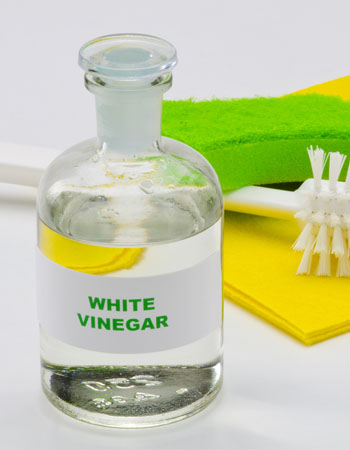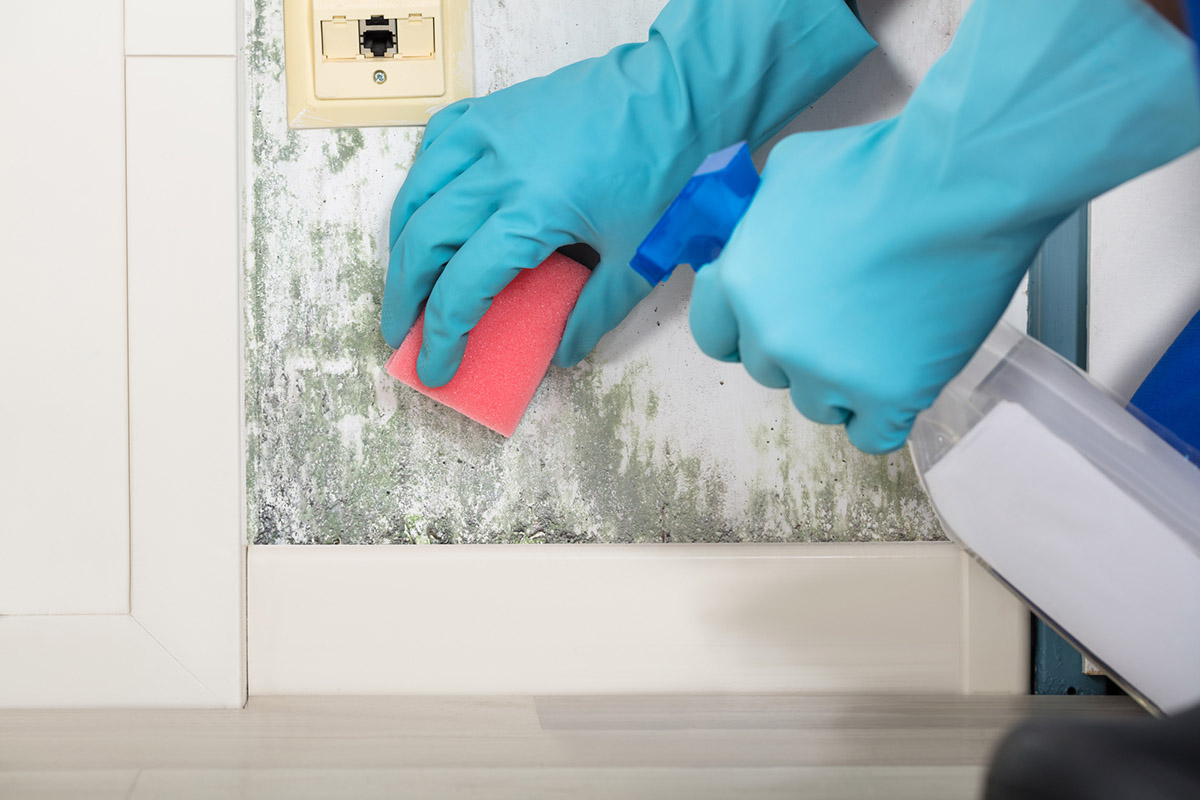We may earn revenue from the products available on this page and participate in affiliate programs. Learn More ›
Q: I was moving some furniture around and discovered patches of mold on the wall! How can I get rid of it? Does vinegar kill mold, or should I use bleach?
A: If moisture levels are high, there’s always a risk of mold growth. Mold usually grows on walls near the baseboards or up around the ceiling. Areas like bathrooms or basements are particularly prone to mold growth. Mold exposure is associated with several issues like allergic reactions, breathing problems, and asthma.
When you discover an ugly patch of mold, you may wonder: Does vinegar kill mold? Vinegar has both antifungal and antibacterial properties and can be a budget-friendly and effective treatment. Before cleaning the mold, though, it’s important to address the moisture problem that led to the mold growth in the first place. Targeting the mold without addressing the underlying moisture issue will almost certainly lead to regrowth.
Vinegar has antifungal and antibacterial abilities, so it can fight off mold effectively.

Does vinegar kill mold? Yes! Household white vinegar contains between 5 and 8 percent acetic acid. Acetic acid has a pH of around 2.5 that can disrupt the growth of a range of microorganisms. You can clean small amounts of the mold with vinegar yourself, but know when to call professionals. The Environmental Protection Agency advises hiring professionals if there is mold that covers an area 10 square feet or larger. You may also need to hire a mold removal specialist if the mold has penetrated the heating, air conditioning, or ventilation system.
Vinegar can kill black mold and is best used on nonporous surfaces.
White vinegar is a powerhouse for cleaning, deodorizing, and disinfecting around the house. It can also kill black mold, a mold that commonly appears when there is water damage. Spray vinegar onto the moldy surface and leave it for an hour. Then wipe the area clean with water and allow the surface to dry. Any smell should clear within a few hours.
While it’s safe to use on most surfaces, vinegar is unlikely to be effective at cleaning mold off of soft surfaces. If there is mold on floor coverings or other malleable surfaces, they will need to be replaced.
Vinegar with about 4 percent acetic acid can kill Penicillium chrysogenum but not Aspergillus fumigatus mold.
A 2015 study found that vinegar with about 4 percent acetic acid was capable of treating common household molds including Penicillium chrysogenum but not Aspergillus fumigatus. The former is often found in damp environments, while the latter can be found in plant matter and soil. When in doubt about the kind of mold present, consult a professional, who will be able to make the distinction.
Vinegar is safe on most surfaces including wood, but flooring manufacturers often include warnings to avoid cleaning wooden floors with vinegar since it can damage the protective finish. Do not mix vinegar with bleach; the mixture can create toxic chlorine gas. In addition, do not mix vinegar with hydrogen peroxide. The reaction creates a toxic chemical called peracetic acid that can potentially irritate the skin and eyes.

Vinegar successfully kills mold on drywall and leather.
Does vinegar kill mold on drywall and leather? You can safely use vinegar to kill mold on drywall, but be careful when scrubbing to not damage the surface underneath. Vinegar is more effective than bleach when cleaning drywall because bleach kills only the mold on the surface, not underneath. This means that the mold is likely to grow back. When bleach is used on porous surfaces, the mold will move deeper into the material to avoid it.
Vinegar can also be used to kill mold on leather, and it’s recommended to dilute the vinegar with a 1:1 ratio of water. Applying the vinegar mix to a cloth can help prevent oversaturating and harming the leather.
Vinegar kills mold on concrete, but it may damage the surrounding layer of cement.
Does vinegar kill mold on concrete? Vinegar isn’t recommended for use on concrete. Since it’s acidic, it may deteriorate the sealant or the cement binding. A professional may be able to help remove mold from trickier surfaces like concrete.


